I. The Rest
I am having the hardest time, deciding where to put the rest in a measure. Should it come at the end of a measure as if you’ve just stopped and needed a few minutes to think where you’re going next? Or should it go at the beginning of the next measure, as if you somehow got distracted and forgot to continue? I smile as I try to figure this out.
II. Missing Max
 I miss my little dog Max at the oddest times. Not when I look at his collar or his leash laid out next to my bed stand, but in the middle of the night when I absentmindedly reach up to pat the space where he used to sleep. Isabella carefully sleeps down at the bottom of the bed, out of the way of any movement.
I miss my little dog Max at the oddest times. Not when I look at his collar or his leash laid out next to my bed stand, but in the middle of the night when I absentmindedly reach up to pat the space where he used to sleep. Isabella carefully sleeps down at the bottom of the bed, out of the way of any movement.
Max slept close to me, well in harms way. I was never sure if he was the sweetest dog that ever lived, or just not the sharpest tool in the box.
III. Audiobook
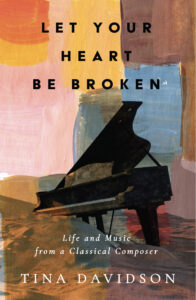 I am reading my memoir, Let Your Heart Be Broken, aloud for the audiobook. This is not an easy thing to do. I have a new respect for the muscles of the lips, mouth and cheek, and where I put my tongue to articulate a word. I am constantly dropping plurals, fumbling over words, or seeing the end of the sentence at the same time I see the beginning, and reordering the words. My engineer often raises his head from my book as he follows along with a look, and even will repeat a fugitive word for me.
I am reading my memoir, Let Your Heart Be Broken, aloud for the audiobook. This is not an easy thing to do. I have a new respect for the muscles of the lips, mouth and cheek, and where I put my tongue to articulate a word. I am constantly dropping plurals, fumbling over words, or seeing the end of the sentence at the same time I see the beginning, and reordering the words. My engineer often raises his head from my book as he follows along with a look, and even will repeat a fugitive word for me.
The experience of reading my own words into a microphone is strange. Sometimes, as I read aloud, I am possessed by deep memories, as if the words are plunging me back to that particular time. I almost smell the woods, and stumble on the rocks
IV. Choice
I am in a conference call with the Ulysses Quartet, planning how we will work together in the future. The first violinist speaks of an experience she had with the now extinct ensemble Shattered Glass, where the audience could select how they wanted to react to performance, either by listening, drawing or small movements. My mind spun with possibilities: a concert designed with three areas, one for seated listening, another equipped for drawing, and the final area devoid of chairs to allow for movement. An autonomy of response not dictated by convention.
V. Revenge
 My neighbor, on the other side of the creek, cut down a slender adolescent oak I had been nurturing. In a confusion of where the property line was between our houses, the oak found itself outside of my jurisdiction. So he gleefully chopped it down, and dug up all the roots for good effect.
My neighbor, on the other side of the creek, cut down a slender adolescent oak I had been nurturing. In a confusion of where the property line was between our houses, the oak found itself outside of my jurisdiction. So he gleefully chopped it down, and dug up all the roots for good effect.
To get even, I have, over the last five years, planted lots of trees on my property. These trees are never too close to his line, but just close enough to obscure his brick house from view. A black willow, luxuriantly wide and fringy, is now over twenty-five foot tall, happily living by the creek’s edge. The pin oak, red bud, tulip tree and white oak are not far behind. I am quite happy with my revenge.
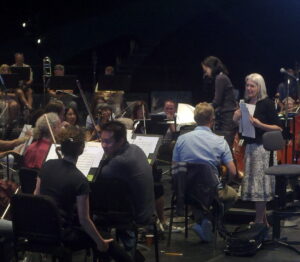 In the music world, a new piece is premiered after working with the performers in rehearsals. We confer about tempos, do a last bit of editing, talk about the musical heart of the piece and how to express it. At the performance, I introduce the work to the audience, or do a pre-concert presentation. But mostly, I am in the audience, listening. I stand for the applause, usually from my seat, or bound up to the stage for a quick bow. During the intermission and after the concert, a few audience members warmly clasp my hands. But most of them dodge around me. Did they not like my work? Or is it too vulnerable to express an opinion face to face?
In the music world, a new piece is premiered after working with the performers in rehearsals. We confer about tempos, do a last bit of editing, talk about the musical heart of the piece and how to express it. At the performance, I introduce the work to the audience, or do a pre-concert presentation. But mostly, I am in the audience, listening. I stand for the applause, usually from my seat, or bound up to the stage for a quick bow. During the intermission and after the concert, a few audience members warmly clasp my hands. But most of them dodge around me. Did they not like my work? Or is it too vulnerable to express an opinion face to face?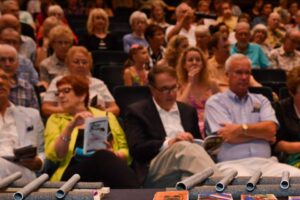 performing abilities. The works they perform are primarily historical, often hundreds years old, and referred to as masterpieces. Contemporary music – our living culture – is not performed with any regularity.
performing abilities. The works they perform are primarily historical, often hundreds years old, and referred to as masterpieces. Contemporary music – our living culture – is not performed with any regularity.
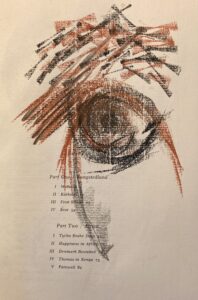 .
.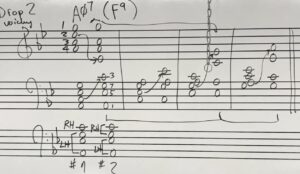 performance, harmony, counterpoint, set-theory, analysis and orchestration before pencil hits the paper. The canon maintains that understanding music history is an essential, and without it the artist gropes in the dark in a vain attempt to reinvent the wheel. The canon implies an order – one must do A before B. It reinforces that personal creativity is not trustworthy unless it is in an old container: it is not credible without context. In other words, one must be coupled to the past to make authentic, groundbreaking art.
performance, harmony, counterpoint, set-theory, analysis and orchestration before pencil hits the paper. The canon maintains that understanding music history is an essential, and without it the artist gropes in the dark in a vain attempt to reinvent the wheel. The canon implies an order – one must do A before B. It reinforces that personal creativity is not trustworthy unless it is in an old container: it is not credible without context. In other words, one must be coupled to the past to make authentic, groundbreaking art. a personal ownership that grows out of doing. I support experiencing writing music before too much comparison. In the initial stage, I want everyone to compose the way they painted in kindergarten. Hardly knowing how to hold a paint brush, they work with abandon and in full confidence of their creative abilities.
a personal ownership that grows out of doing. I support experiencing writing music before too much comparison. In the initial stage, I want everyone to compose the way they painted in kindergarten. Hardly knowing how to hold a paint brush, they work with abandon and in full confidence of their creative abilities.